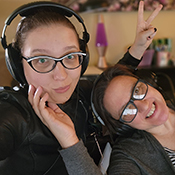 A couple months back, I went into some depth about my personal history as a student, my struggles with high school in adolescence, and my decision this year to go to college for the first time at age 30. I can hardly overstate what a big deal this has been: the college environment is a wholly new experience for me, and it’s been extraordinarily productive in directly addressing the longtime personal trauma of dropping out of high school at 14 and having felt massively inadequate and insecure about myself and my capabilities for most of my life until now.
A couple months back, I went into some depth about my personal history as a student, my struggles with high school in adolescence, and my decision this year to go to college for the first time at age 30. I can hardly overstate what a big deal this has been: the college environment is a wholly new experience for me, and it’s been extraordinarily productive in directly addressing the longtime personal trauma of dropping out of high school at 14 and having felt massively inadequate and insecure about myself and my capabilities for most of my life until now.
After enrolling for the spring semester at a nearby community college and managing a 4.0, I registered for another five courses over the summer term, which I recently completed. These included courses in composition, psychology, human sexuality, philosophy, and statistics. Crucially, unlike the previous semester, I would be taking all of these classes online. For me, this came with plenty of advantages and almost no downsides: it eliminated the inconvenience of dedicating so much time during the week to commuting and attending on-campus courses, which had put a significant burden on my already-busy schedule, and it also meant not missing anything if I happened to have a migraine or otherwise wasn’t feeling well that day. I’ve worked remotely before, so the task of keeping track of various timelines and obligations throughout the week wasn’t anything new to me.
I was pretty excited to take a more diverse array of courses than the previous semester, and they didn’t disappoint. While psychology, human sexuality, and philosophy were essentially introductory overviews of these subjects, they still managed to cover a great deal of ground. The shortened summer term was faster paced, and there was enough material to keep me plenty busy on a weekly basis. Many of the assignments were simply discussion posts and conversations with classmates about a given topic, and there were occasionally opportunities in psychology and human sexuality to discuss my own experiences in the context of LGBT-related subjects. I continued to be surprised this semester by how supportive the college environment is of queer and trans people – it was never treated as anything abnormal, undesirable, or disturbing, and my professors said they enjoyed hearing my perspectives and experiences.
But of the courses I took this summer, probably the most fascinating one was the followup to last semester’s statistics course. Over the entire term, I didn’t once speak to anyone in this course – instead, we were provided with instructional materials and given homework and quiz assignments for each unit. It felt like a very self-taught class, and while I was a bit worried about how I’d do, it turned out to be easy to pick up the various concepts once I’d worked through the exercises. Only our final exam was on-campus, and I managed to get 97% – I wasn’t expecting this, and wouldn’t have been surprised if I’d only scored in the mid-80s. But practicing and reviewing the subject matter consistently and at length really did seem to help drill it into my understanding, and I’m very much looking forward to continuing to study statistics.
My work throughout the semester paid off with another 4.0, and I’ve recently started five more online courses in the fall term, including ethics, geopolitics, public speaking, and a catch-up algebra course that’s required before college-level algebra due to the general mess I made of my high school experience. It all does seem a bit intimidating at first, but after two semesters, I’m increasingly internalizing that this is really something I can do, and even something I can be good at. I’ll make sure to keep you updated. ■



